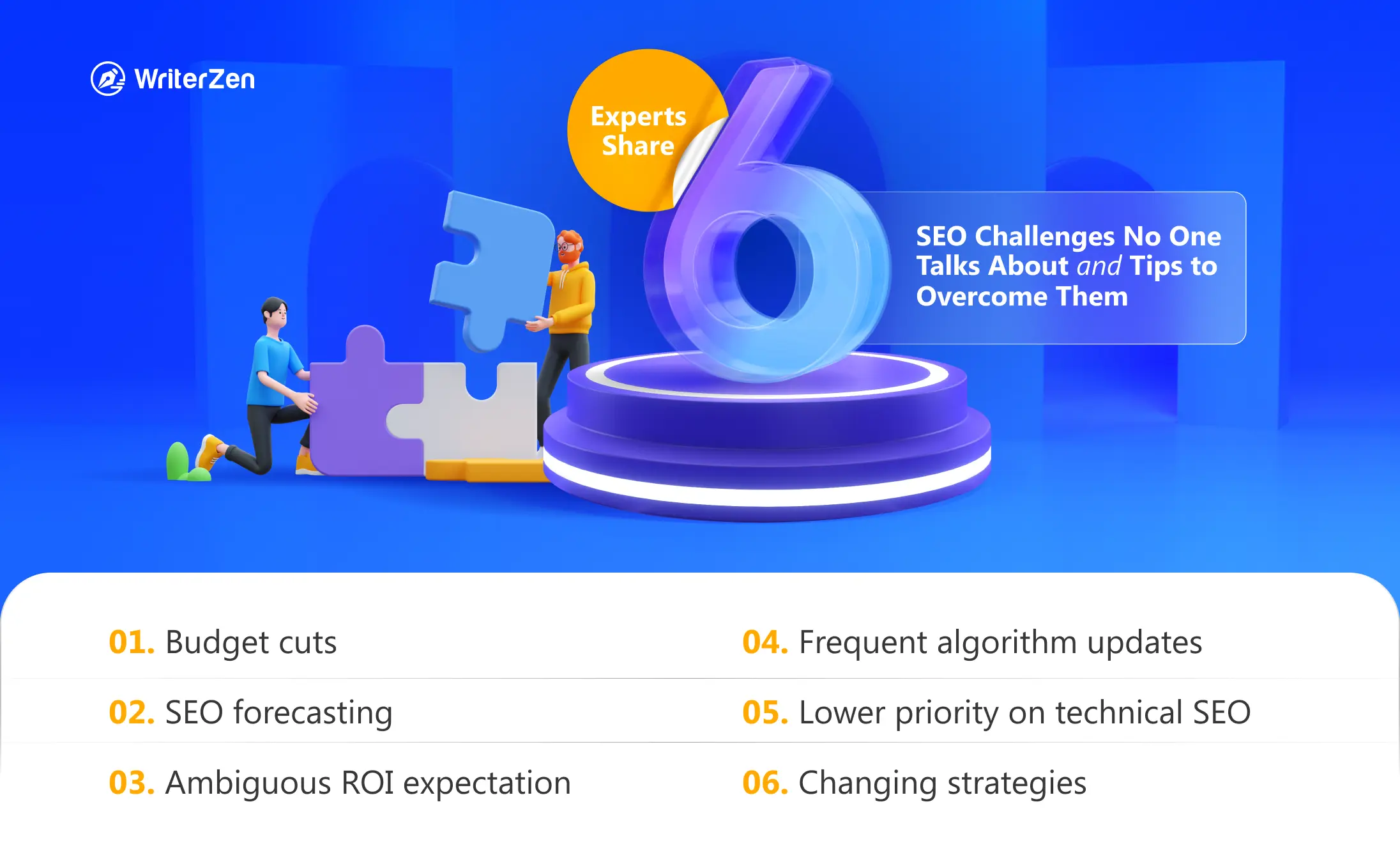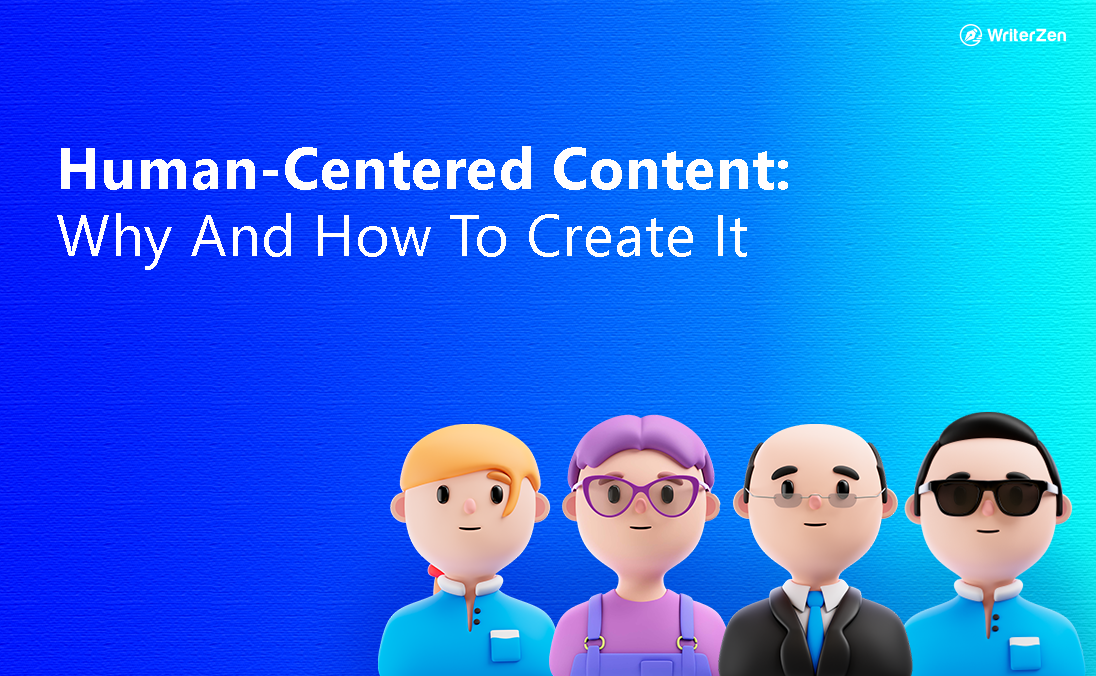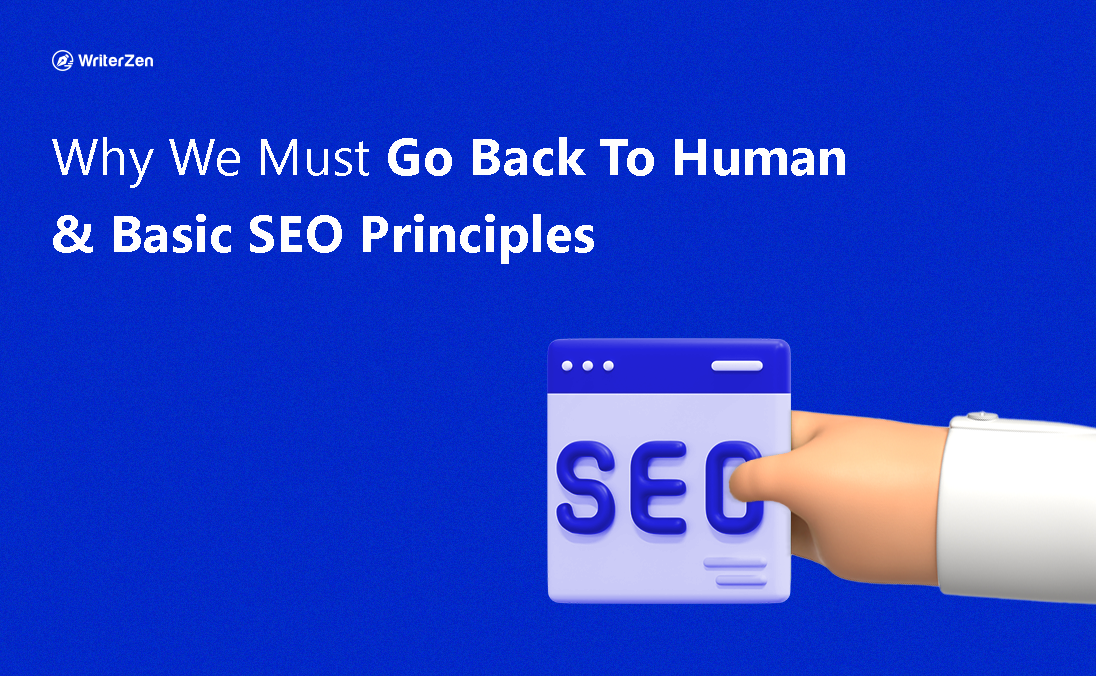We all know the two constant things that keep all the content or SEO professionals on the edge of their seats — emerging trends and challenges. After all, it’s essential to plan for the potential hiccups and SEO challenges ahead.
Sure, you can find plenty of sources sharing SEO problems. But many of them might leave you feeling lost, as most people are just focusing on the surface-level challenges.
So we asked 25 content and SEO professionals working in the trenches to share challenges no one’s talking about. They also share practical approaches to battle them.
This way, you can learn straight from experts and their experiences. Here are the 6 key SEO challenges (according to experts) to overcome in 2023:
-
Budget cuts
-
SEO forecasting
-
Ambiguous ROI expectation
-
Frequent algorithm updates
-
Lower priority on technical SEO
-
Changing strategies
Budget Cuts Becoming a Major Bottleneck
When revenues take a hit in uncertain times like this — most companies’ recovery plan includes a marketing budget cut. With a smaller budget and fewer resources, achieving big goals becomes challenging.
According to our survey, 98% of respondents said budget cuts hinder SEO success. Although the majority agree on this, they have different viewpoints on how budget cuts can become constraints.
“In most cases, budget constraints can limit the effectiveness of an SEO strategy by limiting resources available for executing successful campaigns. That said, there are still efficient ways to execute an effective SEO strategy – even when dealing with limited funds,” Lisa Dietrich, partner at Girokonto, opens up.

“Budget cuts can absolutely hinder SEO success. With less resource to accomplish tasks, like hiring writers to help publish content, your SEO success will definitely slow,” Dustin Montgomery echoes.
While some suggest achieving SEO success becomes difficult with a lack of resources, others argue budget cuts don’t prevent SEO success. It rather slows down the outcome you’ve set in the beginning.
Here’s what the experts suggest to overcome this issue.
Lisa Dietrich shares, “Our team at girokonto.io has found success by focusing on high-value activities such as keyword research and creating targeted content pieces.
“We also use free tools such as Google’s Search Console or Moz’s Keyword Explorer Tool, which allow us to track performance metrics within our budget constraints. Ultimately, these strategies allow us to capitalize on opportunities while remaining mindful of our budget limitations.”
“Building out a solid SEO strategy at the start of the campaign, outlining the recommended activity, and the potential gains each activity piece could provide a site will help keep a client invested and hopefully prevent budget cuts, however, having a strategy in place means that you can alter your activity plan accordingly to budget changes,” adds Alex Dutchie.
“Ensuring your plans contain itemized activity, with associated costs and potential outcomes (number of pages created, keyword rankings that will be achieved, potential organic traffic gains by doing the activity), will enable you to understand where cuts can be made and still provide a good result for a site.”
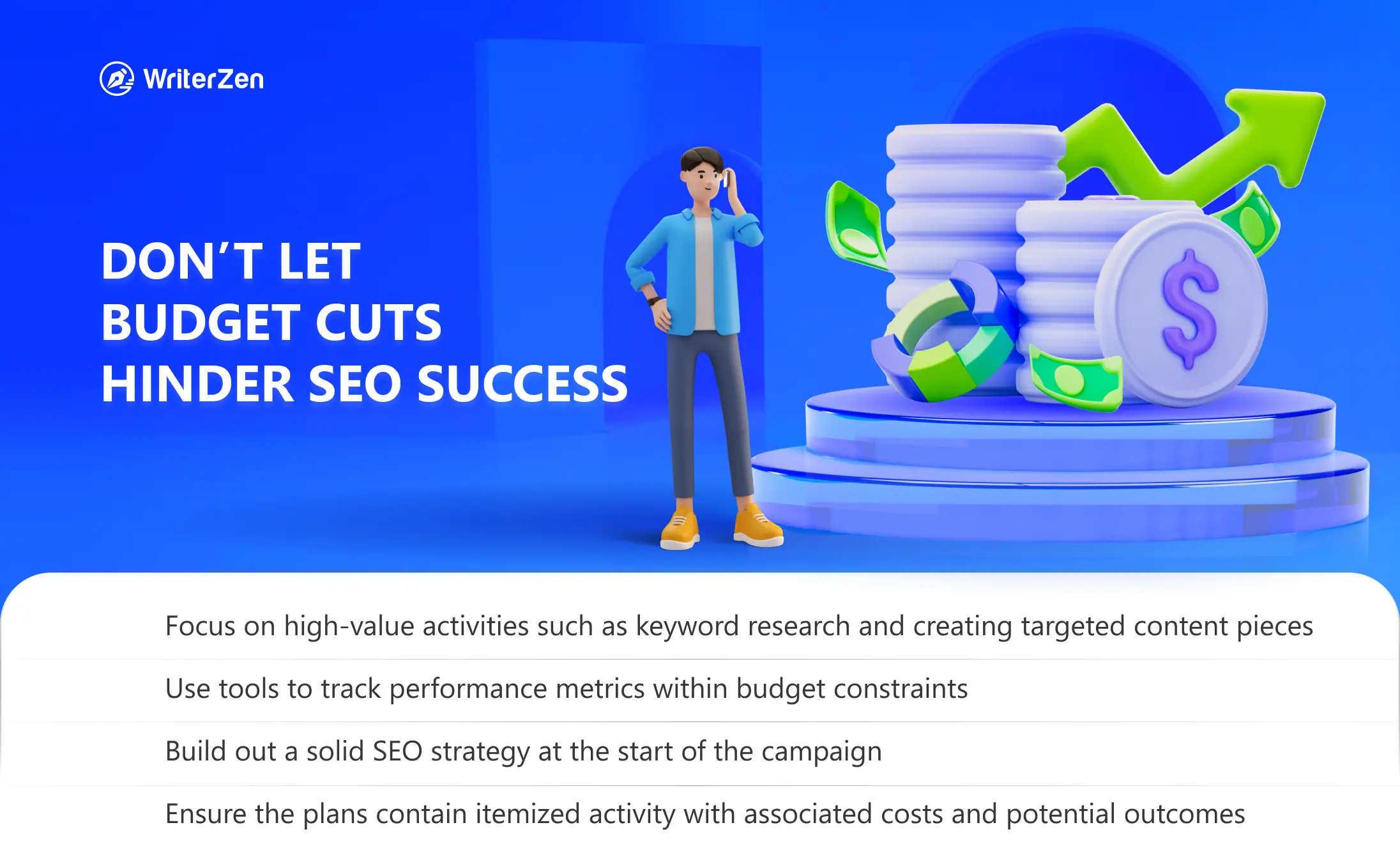
“Focusing on those activities which will provide the biggest results can then help win over the person who controls the SEO budget, to hopefully win them over and increase available resources,” continued Alex.
Putting SEO Forecasting on the Back Burner
For agencies and companies, SEO forecasting holds significant value. Because it helps you predict search engine optimization efforts, organic growth, incoming leads, and sales.
Imagine not knowing how your campaigns are performing without proper data. Or worse, you’ve to make assumptions to decide whether to continue with the campaigns, make adjustments or discontinue them.
Ken Marshal recognizes it as a nightmare for SEO professionals, “Forecasting is a nightmare for most SEOs because they don’t have the right data points, software, or statistical modeling experience needed to accurately forecast traffic, lead, and sales increases from their SEO efforts.”
“This is the biggest challenge because, heading into 2023 and beyond, companies are more focused on ensuring that they can prove ROI with all vendors, not just marketing. So giving them confidence at the beginning of an engagement with a reliable forecast is key,“ adds Ken.
To reinforce this claim, Kevin Indig shares the same concern in his Tweet.
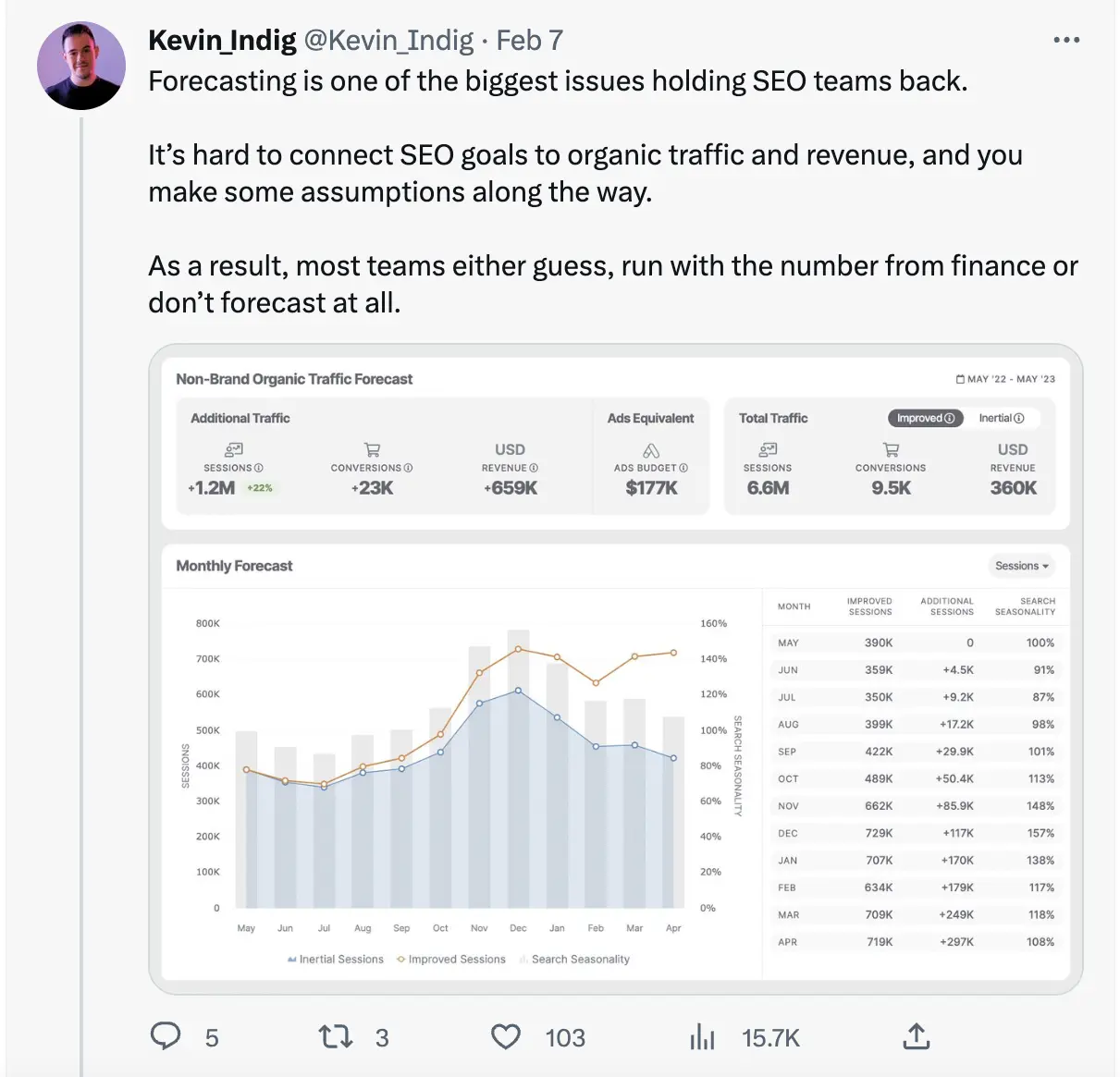
Here’s what Ken Marshall recommends to overcome this issue.
“Expectation setting is key. So many SEOs are incapable of setting correct expectations throughout the lifecycle of a campaign because they don’t have the first two points in place.
Without a good forecast or proper attribution, you can’t make strategic or implementation decisions.”
“When you don’t have the correct data guiding your decisions, you set unclear or incorrect expectations for your clients. This leads to a lot of activity, and some keyword or traffic level improvements, but in most cases will cause a failure to deliver on key business objectives like SQL or sales increases,” adds Ken Marshall.
In his Tweet, Kevin Indig also shares, “One tool I like for SEO forecasting is SEOmonitor because it lets you define and adjust the parameters. For example, the algorithm calculates the estimated additional sessions at a keyword level by considering all the keywords attributes.
I understand you can’t give away the “secret sauce” as a vendor, but I’m also not a fan of “proprietary algorithms.” The more transparency, the better! SEOmonitor’s forecasting feature lets you define a rank target for keywords, timeframe, progress speed and includes search volumes, seasonality, device segmentation, and past conversion rates.
My favorite: The model takes SERP Features into account to calculate CTR. As an SEO, you could even use it to estimate the ROI of SEO for prospects.”
ZenTip: We suggest you use Google Analytics or Google Search Console for gathering data and studying them. Identify any trends and find out where the client should focus. You can also do SEO forecasting without Google sheets or templates.
Ambiguous ROI Expectation
According to SEJ’s recent SEO report, “over half of the SEO practitioners (58.0%) reported an increase in the ROI for their work. Still struggling with proving ROI remained at the top of the list, especially for freelancers, and 29.0% of SEO professionals reported feeling ambivalent about their ROI.”
To support this data, Aaron Anderson opens up, “it’s often stated that “SEO takes time. However, this really varies and depends a lot on your industry, your website, and what you’re offering.”
“While it’s best always to expect results to “take time”, we can often use this as a rationale for companies to do very little and sell people on the idea of being patient. If SEO takes time, make sure you understand the exact reasons as to why it should take time in your particular situation, and don’t be shy in questioning that logic,” adds Aaron.
“Whether you deal with your own clients or a manager in an enterprise SEO environment, setting expectations for SEO performance is always going to be a primary challenge. Most people — even many professional marketers — don’t know that SEO takes time to show results. They expect instant or near-instant movement, and that’s often just not realistic,” echoes Alexander Lindley.
Most times, SEO efforts take several months to show some results. Even if business owners pour big budgets into speeding up the process, they might not see the expected outcome in a short timeframe. This puts SEO professionals in an uncomfortable situation.
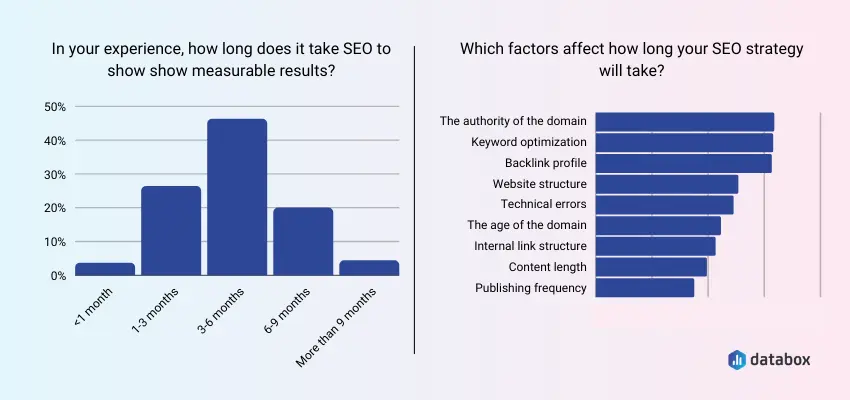
There are several factors that affect the rankability of a website. Among them, some of the most important factors that affect SEO outcomes are:
-
Keyword optimization and
-
Backlink profile
Websites that use expertise, show authority, and build trust rank faster. So how do you cover these three important ranking factors with one strategy?
Simple. Focus on building authority in your niche, create more high value and humanized content consistently, and get quality backlinks.
Alexander Lindley adds, “To overcome this challenge, go to great lengths to connect particular SEO activities to particular results. This paints the full picture for the client or manager — what we did six months ago is showing this result now. That way, they learn what to reasonably expect from SEO.”
Ken Marshall explains, “The challenge here is to connect which keywords you’ve targeted and what implementations you’ve done over time to direct increases in organic impressions, clicks, website traffic, leads, qualified leads, sales, and ultimately, revenue. This requires you to have really accurate analytics, event-based conversion tracking, and CRM tracking in place on top of a solid understanding of the full funnel to track.”
Constant Algorithm Updates
Google changes its algorithms frequently. And it’s no surprise that getting hit by algorithm updates is the top biggest challenge SEO practitioners face.
Witnessing sudden dips in traffic and getting penalized by Google are some of the worst nightmares. On this matter, Harry Boxhall opens up, “One of the biggest challenges of SEO that are rarely discussed is the lack of control over external factors that can affect a website’s search engine rankings.”
“For example, changes to Google’s algorithm or updates to the way search engines crawl and index websites can have a significant impact on a website’s visibility,” adds Harry.
“The first challenge is the difficulty in keeping up with constantly changing algorithms and best practices. Google and other search engines are constantly updating their algorithms, making it difficult for businesses to keep up with the latest changes and ensure that their website is properly optimized.” Binny joins.
“To overcome this challenge, it is important to stay up-to-date on industry news and changes and to have a flexible approach to SEO workflow that allows for quick adjustments as needed,” suggests Binny.
“It can be hard staying on top of all the changes and making sure that your content won’t take a hit from any rollouts. To overcome this, stick with what you know works. Create helpful content, make sure your Core Web Vitals are up to par, answer questions you know are being asked, and make sure you frequently check Google updates,” Brittany Mendez shares.
“To stay up to date with algorithm updates, it’s important to follow the advice of industry experts who specialize in SEO and pay attention to developments in search engine technology. Keeping a close eye on competitors’ activities can also provide insight into changes in the market and upcoming trends. Additionally, subscribe to reliable SEO newsletters and check for updates on search engine blogs,” Brandon Schroth explains.
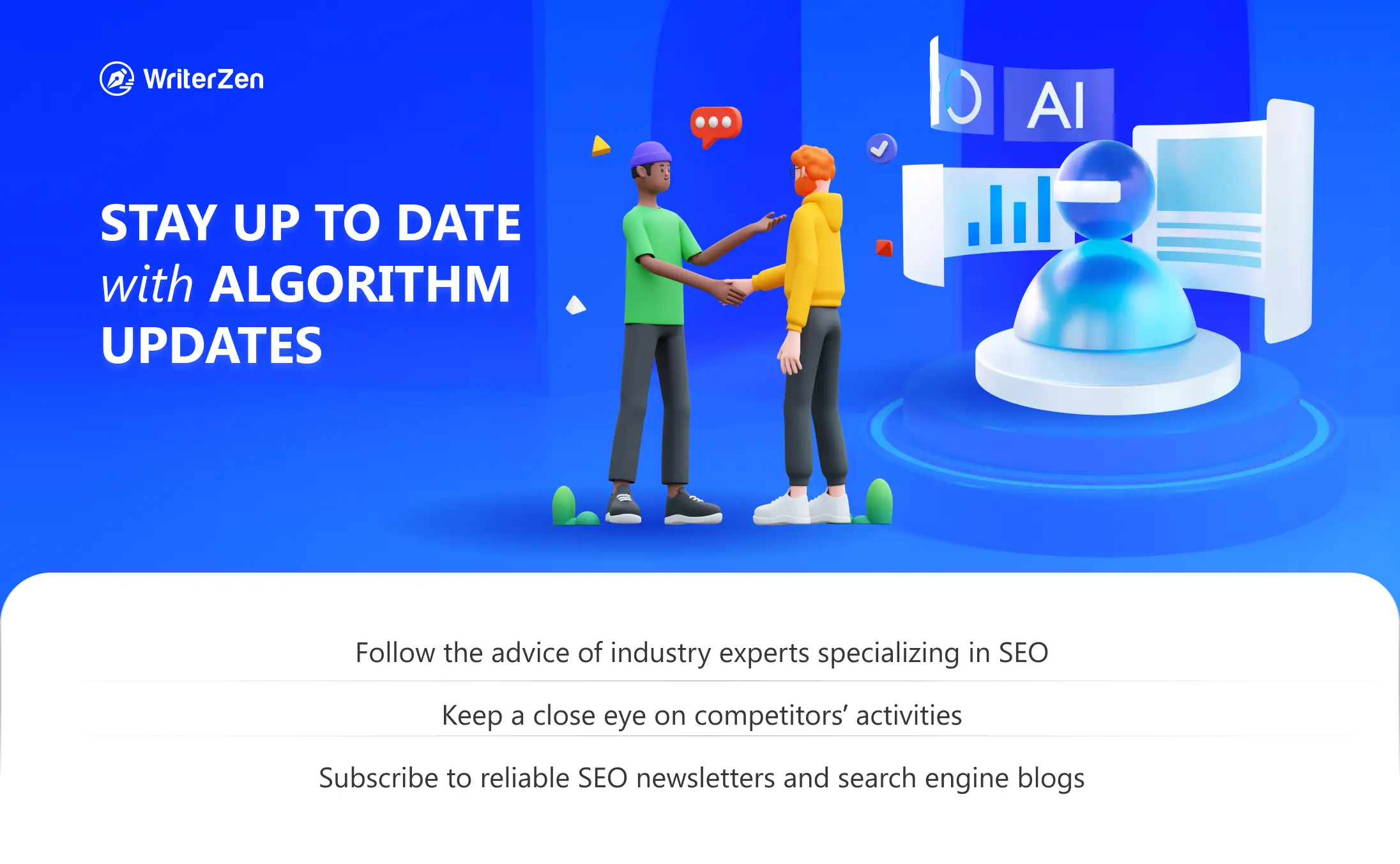
Brandon also adds, “Creating content that effectively builds authority requires research into relevant industry topics and creating content that answers to complex questions in an easy-to-understand way. Additionally, reach out to experts on the topic and ask for quotes or guest post opportunities. This will help to create backlinks from authoritative domains, as well as add credibility to your content.”
Neglecting Technical SEO
Although technical audit is pivotal to SEO success, it is given little importance in most SEO strategies, according to Databox.
Alex Duthie says, “Getting technical changes implemented – Technical audits can be incredibly powerful and transformative for a client’s SEO performance; however, I have historically found that getting technical recommendations actioned by clients/developers/IT can be incredibly difficult.”
To back it up, SK Rafiqul Islam says, “Many clients are not aware of the fact how much technical issues can affect their SEO performance.”
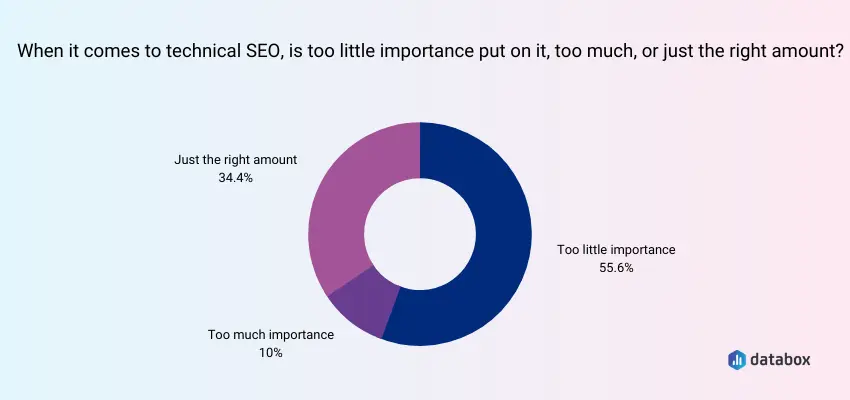
This happens many times in SEO services. We used to educate the client about why it matters and how to prioritize solving any specific technical SEO tasks.”
Technical SEO is more important than ever. It does not just help you rank higher on Google's search results page but also makes sure that you are ranking for the selected keywords. Technical SEO ensures your site loads faster, which can have a huge impact on the user experience.
A strong technical SEO foundation in place supplements your website to avoid any damage in the long run. A good SEO strategy covers technical, On-page, and Off-page factors.
Changing Priorities and Strategies
Many organizations run amuck to adjust their strategies as soon as new algorithm updates roll out or they see no positive impact on ROI.
We get it.
Many leaders are like deer caught in headlights when it comes to keeping their businesses afloat in hard times. They frequently shift priorities and change strategies in the hope of meeting the end goal — an uptick in revenue.
But often, this causes more distraction to SEO teams.
Pointing to this, Alexander Lindley shares, “SEO and search engines change all the time — nearly every day, there’s some bright, shiny new development. Over time, some of these changes add up to make a difference. But for the most part, they amount to nothing more than distractions from what matters most.”
“But many SEOs dive in head-first every time there’s a slight algorithm update and change everything, often with no results to show for it. They’d be much better served by sticking to the fundamentals and making sure those are exactly right: finding the right keywords, creating great content, building backlinks, and making sure your website is functional.”
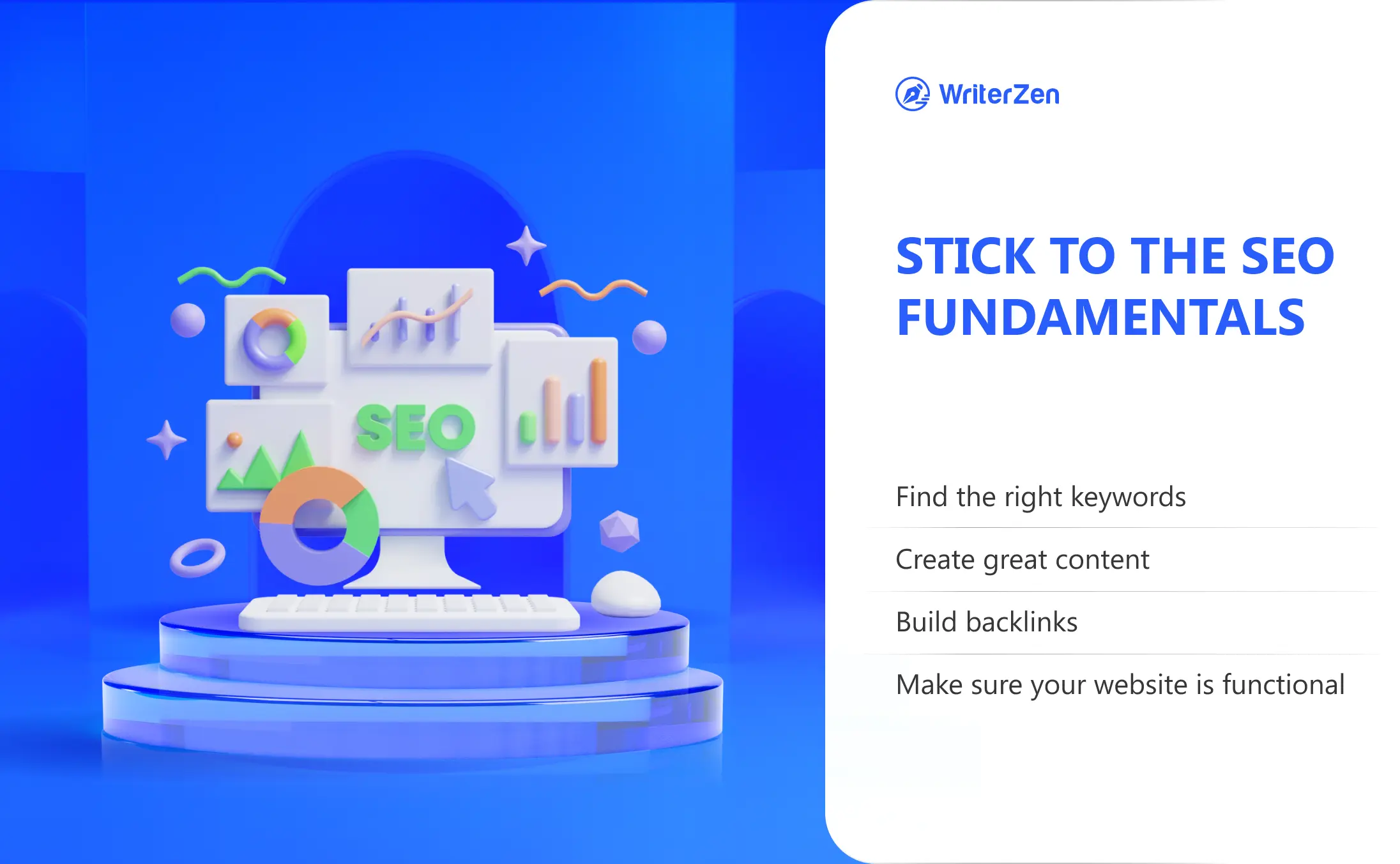
Generating desired results in SEO requires patience, persistence, and focus. Shayla P. also echoes, “When SEO priorities change, it’s important to get clear on your new strategy. Often, we get stuck doing the same thing, expecting different results. Instead, refocus with a brainstorming session and find ways to approach your new priorities.”
Explaining how they’d resolve this challenge, Brandon Schroth writes: “Handling changing priorities or strategies requires a level of flexibility, organization, and open communication. To begin with, it is important to recognize the new priorities or goals and be prepared to adapt resources accordingly.”
“This may mean rearranging tasks on the timeline or reallocating staff and/or budget for different areas as needed. It is also important to document changes in strategy and prioritize communication within teams so everyone is aware of what’s being asked of them.” continued Brandon.
“Trust should be instilled in team members so that they are able to adjust quickly without always relying on specific direction from leadership due to how often strategies can change.”
“Finally, regular course corrections should be established that allow teams enough time to stay aligned towards the common goals while still allowing maneuverability for changes in priority when necessary,” notes Brandon.
ZenTip: Staying in constant communication with SEO teams and proactively updating the SEO strategy to maximize your company’s success is the way to stay on top of your game.
Final Thoughts
With the new problems ahead, we believe SEO will remain a core component of all marketing efforts. SEO can still be a powerful lever in establishing your brand.
Make sure your SEO efforts are in-line with Google's guidelines so they don't end up costing your business a hefty sum or losing precious customers altogether.
By ensuring to give forecasting and technical SEO more importance and setting more realistic expectations, you’ll be all set to tackle the challenges ahead of you.


